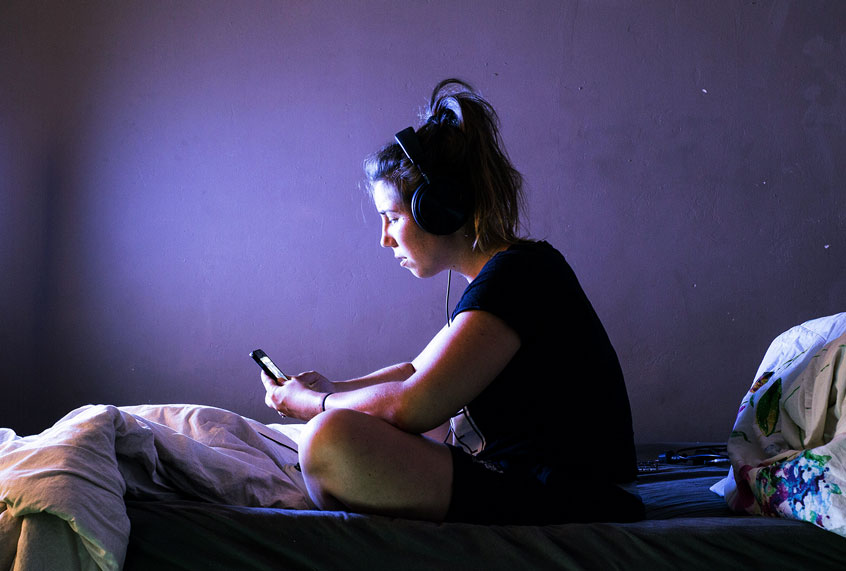The pandemic has brought into glaring relief the systemic ills of the United States that have gone unacknowledged by those in power for too long. As a psychologist who has studied the effects of technology on our relationships and mental health for the last 15 years, I see another reality emerging clearly from the crisis: specifically, our technology has made us uniquely unable to handle the isolation, boredom, and uncertainty that is now part of daily life.
What do I mean by this? Isn’t tech the very thing keeping us connected as we hunker down? Perhaps — but our immediately gratifying, always-on technology has also eroded our ability to adequately evaluate information and to self-soothe. In a pandemic, those skills aren’t merely nice to have; they are essential.
As we head deeper into quarantine, we face what space, submarine, and Arctic researchers call the “third quarter phenomenon.” The emotional and psychological reserves we’ve used in this difficult time are low and we are agitated, worn thin, and anxious. In short, the isolation is getting to us. That our technology has acclimated us to easy and quick fixes and instant access to information makes the third quarter phenomenon even more stressful. Before any of us had heard of COVID-19, our ability to self-regulate, withstand uncertainty, and delay gratification had already been whittled away by the way in which we engage with our omnipresent devices. The third quarter phenomenon presents us with problems that we are ill-equipped to manage.
A primary finding of my research is that our near-constant engagement with technology has led us to be uncomfortable with waiting. Given that we can access multiple information sources at any given moment and that we can obtain nearly any object with the tap of a screen, we lack practice and experience with delays of any kind. As a result, we’ve become woefully unfamiliar with the strong emotions that accompany waiting. We have a desire, interest, curiosity or need — and we instantly find something to meet it, never developing the grit and emotional regulation that result from tolerating the unknown or un-procured. If we do have to wait, we feel powerless and have no commensurate regulation skills with which to soothe ourselves. When we can’t have what we want, we feel irritable, with no ability to effectively work through and resolve this feeling.
Similarly, the ability to sit with complexity is diminished when a bulk of our experience is determined by the news, information, and digital experiences that our algorithms serve us. Access to easy and instant information, it seems, makes us just as uncomfortable with complexity as we are with waiting. This leaves us in a precarious position in times like this. We saw evidence of this last week when videos decrying medical evidence about COVID-19 and a coming vaccine (simplifying the complex issue) were shared wildly at the exact time that the medical community expressed the complexity of both the virus and the undeveloped vaccine, stressing that it would be some time before we had any definitive answers. The former videos eclipsed the latter data in the online “water cooler conversations” of the week, seemingly confirming our preference for tidy, solid “answers” rather than the reality of the unknown and uncontrollable.
In times like this, technology makes us feel powerful because it helps us find what we believe to be answers, then offers unlimited opportunities to share them. This would be fine if we practiced solid research and evaluation skills, if we vetted every source, and if we could tolerate the waiting required to cross reference and look outside of the information that our algorithm delivers to us. We do not, however, do these things.
COVID-19 and its global effects are complex. Access to trusted technology sources that are not based in science makes it seem much less so. When these sources inform so much of our personal, communal, political, and, even spiritual sense of self, we put ourselves at risk of being intoxicated with easy answers. Then we offer them up to others. This puts all of us at risk.
Given that the World Health Organization is rightly raising awareness about the coming surge in mental health difficulties that are, and will continue, to present themselves as we continue to wade through the pandemic, it is crucial that we step away from our screens for a bit in order to re-engage our abilities to wait, to think critically, and to remember that we can tolerate complexity. It’s time to come to terms with the unknown course that we are on, and to work through our emotions about feeling out of control. It’s time to practice our abilities to delay and self -soothe rather than grasp and react. When we do these things we are tending to our mental health as much as our physical health. In a time like this, we are also fulfilling our duty as members of a frightened community. This is a quarantine takeaway that would be well worth waiting for.


